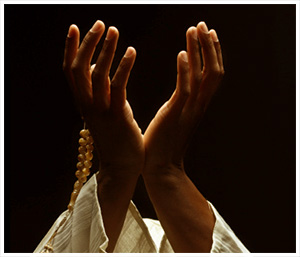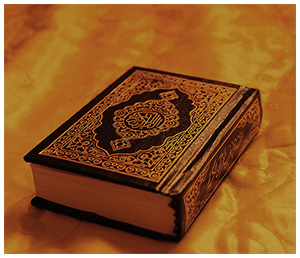Ramadan is the season of prayers fasting as well feasting. It is month dedicated entirely to Allah and to his blessings. So seek His blessings by chanting these special prayers so that your sin may be washed by His divine blessings. So go through these situational prayers and chant them as per your requirements. And if you feel this section truly helped you to seek the divine blessing, do refer this page to your near ones so that they could do the same as well.
One of the first prayers I ever learned was the one all Muslims recite when they break their fast. I was barely four (and of course not fasting) when I learned it. And it was my job at iftaar (the fast-breaking meal at sunset) to recite this out loud, after which the fasting members of my family would break their fast with a date. Fasting does not end unless this prayer is recited:
"Allahuma inni laka sumtu wa bika aamantu wa ‘alayka tawakkaltu wa ‘ala rizq-ika aftarthu."
Oh Allah! I fasted for You and I believe in You [and I put my trust in You] and I break my fast with your sustenance."

Ramadan is a time when Muslims are told through the Qur'an and in hadiths that God will absolve them of their sins if they engage in sincere worship and repentance. The following prayer is a good one to recite during Ramadan to ask for Allah's forgiveness:
"Allahumma inni as'aluka birahmatika al-lati wasi'at kulli shay'in an taghfira li."
Oh Allah, I ask You by Your mercy which envelopes all things, that You forgive me.
This is a prayer that Abdullah ibn Amar, a companion of the Prophet Muhammad, used to recite as he was breaking his fast, as reported by Ibn abi Mulaykah.

Muslims scholars agree that Ramadan is such a holy month that any sort of prayer, whether it is a personal one from your heart or one from the Qur'an or other Islamic sacred texts, will surely be received by Allah and the rewards for those prayers will be numerous. But the Prophet Muhammad did recommend Muslims to recite certain du'as at particular times during Ramadan. For example, during the first 10 days of the months, reciting the following prayer provides extra benefits:
"Rabbigh fir war hum wa anta khair ur rahimeen."
Oh my Lord and Sustainer please forgive me and be merciful to me. You are the best amongst those who show mercy.
This prayer, which is from the Qur'an, was recommended by the Prophet Muhammad to be recited as much as possible during the second 10 days of Ramadan for maximum rewards and forgiveness of sins. This prayer is special for me, as my father advised me to recite it during the first Ramadan I shared with my husband after our marriage, when I was pregnant with our first child, on bed rest, and unable to attend taraweeh prayers at our mosque in New York City.
"Allahumma innaka afuwun tuhibbul afuwa faafu anna."
Oh Allah indeed you are the greatest pardoner and you like the act of pardoning. Hence, please forgive us.
This particular prayer was recommended by the Prophet Muhammad to be recited during the last 10 days Ramadan as much as possible. It beseeches God to forgive us, because God is indeed the best at forgiving humans for their mistakes.
"Astaghfirullaha rabbi min kulli zambin wa atabu ilaih."
I seek forgiveness of all my sins from Allah who is my lord and sustainer and I return back in repentance to him alone.
Zikr, or prayers recited over and over again in the remembrance of God, is often thought to be part of the Sufi Islamic tradition, when in fact it is an integral part of all Muslims' lives and especially important during Ramadan. A great way to connect with God while doing all the mundane chores of daily life (driving, waiting in line, preparing the evening meal), is to recite over and over these short phrases:
Subhan'allah, an expression used by Muslims to express strong feelings of joy or relief and recalls how everything Muslims have is thanks to Allah.
Alhamdulillah, or "Praise be to God!" (It is a Qur'anic exclamation with a similar meaning as hallelujah.)
Astaghfirullah, which means "I seek forgiveness from God."
Allahu Akbar, or "God is the Greatest."